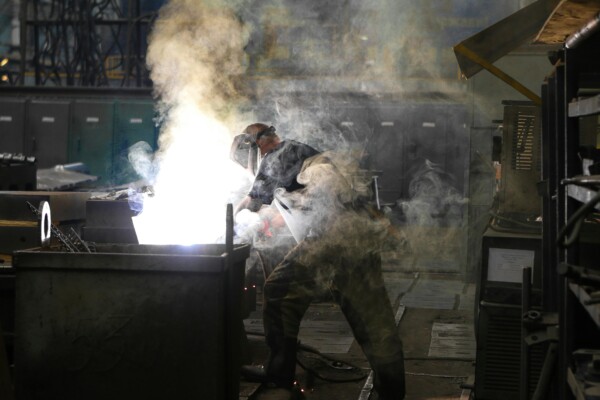 Are you wondering how industry-specific ERP solutions can revolutionize the manufacturing industry? Well, the short answer is that these solutions drive efficiency and cut costs. As for the long answer?
Are you wondering how industry-specific ERP solutions can revolutionize the manufacturing industry? Well, the short answer is that these solutions drive efficiency and cut costs. As for the long answer?
As a diverse and multifaceted sector, manufacturing presents a myriad of challenges ranging from supply chain intricacies to production complexities. In response, industry-specific ERP solutions not only address these challenges, but also drive efficiency, cost-effectiveness, and overall success throughout the manufacturing landscape. ERP customization and innovation carry a powerful intersection, fostering a culture of continuous improvement and positioning businesses for sustained success in the dynamic manufacturing landscape.
Efficiency takes center stage as a core theme as industry-specific ERP solutions optimize and streamline manufacturing processes. By offering functionalities tailored to the nuances of different manufacturing environments, such solutions empower businesses to enhance productivity, minimize downtime, and achieve smoother production workflows. Real-time data insights, predictive analytics, and collaborative tools become integral components in fostering a more agile and responsive manufacturing ecosystem– crucial for staying competitive in the global market.
As ERP solutions drive efficiency, they also help manufacturing businesses pursue cost-effectiveness. Through meticulous planning, demand forecasting, and resource optimization, manufacturers keep waste and operational costs to a minimum.
These solutions and benefits not only promote financial metrics, but also allow businesses to strategically adapt to market dynamics, respond to customer demands, and foster a culture of continuous improvement. By adopting tailored ERP solutions, manufacturing businesses can position themselves as industry leaders, capable of navigating the complexities of the modern manufacturing landscape with agility and foresight.
You may be wondering, “How do I know that ERP solutions can promote efficiency, cost-effectiveness, and agility in my own manufacturing business?” Let’s dive into the specifics.
 Innovation in Manufacturing: Unleashing the Potential of ERP Technologies
Innovation in Manufacturing: Unleashing the Potential of ERP Technologies
Primarily, ERP solutions seek to provide innovation and transformation for the business as a whole—not just a band-aid technical solution for a single problem. A large benefit of industry-specific ERP solutions is their ability to adapt to technological advancements.
In the rapidly evolving landscape of manufacturing technologies, businesses need systems that can seamlessly integrate emerging innovations. ERP providers such as SAP stay at the forefront of technological progress for the solutions they develop, incorporating features such as Internet of Things (IoT) integration, artificial intelligence (AI), and advanced analytics. By doing so, businesses not only stay technologically relevant, but also leverage these advancements to drive innovation in their operations.
A business’s ultimate destination is often long-term success. Recognizing this need, ERP solutions foster innovation and adaptability, strategically placing businesses on a trajectory for sustained success. Providers such as SAP maintain a forward-looking approach, anticipating industry trends and aligning ERP systems with the future landscape.
Below is a list of a few specific ERP technologies that promise innovation for the manufacturing industry:
- MES-ERP Integration: A Game-Changer
In the dynamic landscape of manufacturing, middle-market companies are increasingly adopting new strategies and embracing factory automation. One notable strategy gaining traction is the integration of Manufacturing Execution Systems (MES) with ERP. This integration addresses the need for competitiveness and resilience in the face of evolving technological advancements.
Advantages of MES-ERP Integration:
- Real-Time Data Visibility: The seamless flow of real-time data throughout the organization is crucial for informed decision-making. MES-ERP integration establishes a dynamic ecosystem where leaders gain up-to-the-minute insights into critical facets of their operations. This includes production processes, inventory levels, and resource utilization. Armed with timely information, decision-makers can respond swiftly to changing circumstances and emerging opportunities, transforming decision-making from reactive to proactive.
- Operational Efficiency: Through this leverage, companies optimize manufacturing processes. This leads to increased operational efficiency, reduced waste, and improved resource utilization. MES-ERP integration streamlines communication across the production chain, enhancing overall operational excellence.
- Adaptability to Market Demands: In an era where technological innovation is paramount, MES-ERP integration equips companies to adapt rapidly to changing market demands. Whether adjusting production schedules, managing inventory, or optimizing resource allocation, this integration provides the agility needed to thrive in a competitive landscape.
- Cloud-Based ERP Revolution
Another innovation reshaping manufacturing operations is Cloud-Based ERP. This technology offers several benefits, including scalability, flexibility, and cost-effectiveness. By moving ERP systems to the cloud, manufacturers gain real-time access to data, seamless collaboration, and simplified maintenance. It enables them to focus on core business activities while leaving infrastructure management to cloud providers.
- Future-Proofing with Smart Factories
Manufacturers are harnessing advanced technologies such as sensors, data analytics, and real-time monitoring to create smart factories. These factories optimize operations, enhance quality control, and enable predictive maintenance. By embracing ERP software, manufacturers future-proof their operations, ensuring they remain competitive and agile in an ever-evolving landscape.
 Manufacturing Excellence: The Role of Industry-Specific SAP Solutions
Manufacturing Excellence: The Role of Industry-Specific SAP Solutions
As a well-established, innovative ERP provider, SAP offers several solutions specific to the manufacturing industry. Overall, their solutions have a strong focus on sustainability.1
The company recognizes that many manufacturers have shifted their focus towards sustainability, aiming to reduce emissions across operations and supply chains while also delivering quality products and services. Additionally, a notable shift toward “servitization” is emerging, with industrial manufacturers embracing service-based business models. Retaining more responsibility for their equipment, manufacturers realize dual benefits – ensuring peak efficiency through expert servicing and fostering the creation of longer-lasting and more easily recyclable products.
As a whole, the industrial landscape is witnessing a transformative wave, driven by technologies such as the Industrial Internet of Things (IIoT), AI, intelligent automation, and edge computing. Beyond powering smart and highly efficient machinery, these technologies offer the visibility and transparency that businesses need to reduce emissions and comply with evolving regulations.
To address these industry changes, SAP’s digital product innovation suite redefines industrial machinery and component design, providing robust functionality for collaborative product development, configuration, and compliance adherence. The integrated design and development platform offer real-time insights for risk detection and decision-making, fostering seamless collaboration and change management. This way, manufacturing businesses can prioritize product safety and regulatory compliance while exploring manufacturing PLM processes, supporting individual order requirements, and promoting sustainable operations through extended product lifecycles.
SAP also offers industrial sales and marketing software, designed to elevate customer experiences with personalized B2B marketing, omnichannel commerce, and quote-to-cash capabilities for configurable products. Manufacturing businesses benefit from SAP-assisted B2B marketing with real-time insights for sales force automation and a single e-commerce platform. Additionally, businesses can enhance dynamic configuration, pricing for complex solutions, and high-volume subscription billing for efficient revenue management.
Finally, many manufacturing businesses are considering a circular supply chains to further promote sustainability. Armed with the right technologies, manufacturers can simulate revenue across multiple customer lifecycles, forecasting the future value of materials and enabling the reuse, refurbishment, remanufacture, and recycling of parts and products. In this pursuit of sustainability, SAP and its partners offer a suite of solutions designed to meet the specific needs of industrial manufacturing. From the SAP Sustainability Control Tower to SAP Digital Manufacturing Cloud, these solutions provide a comprehensive framework for cost-effective transformation and sustainable growth. The path to a greener future in industrial manufacturing is paved with innovative solutions, reflecting a commitment to both efficiency and environmental responsibility.
1 “Industrial Manufacturing.” https://www.sap.com/industries/industrial-manufacturing.html






Leave A Comment